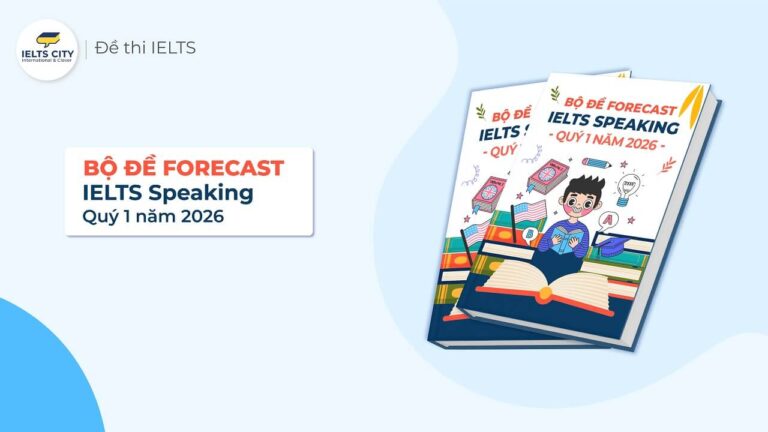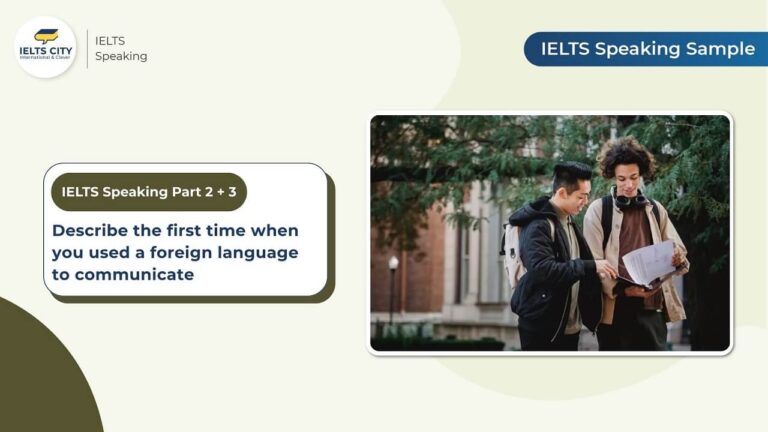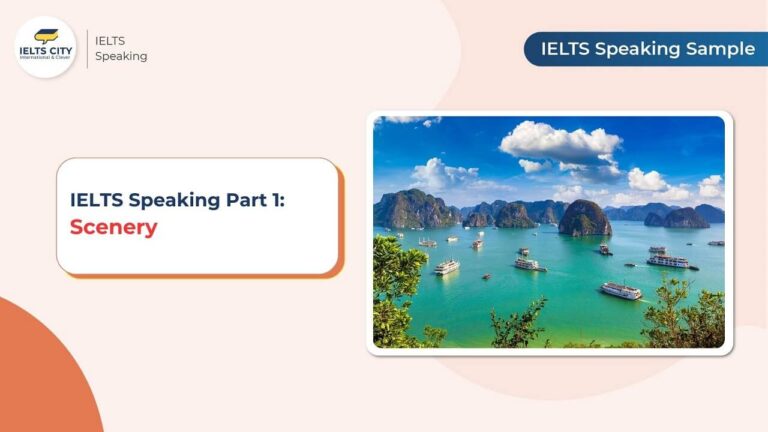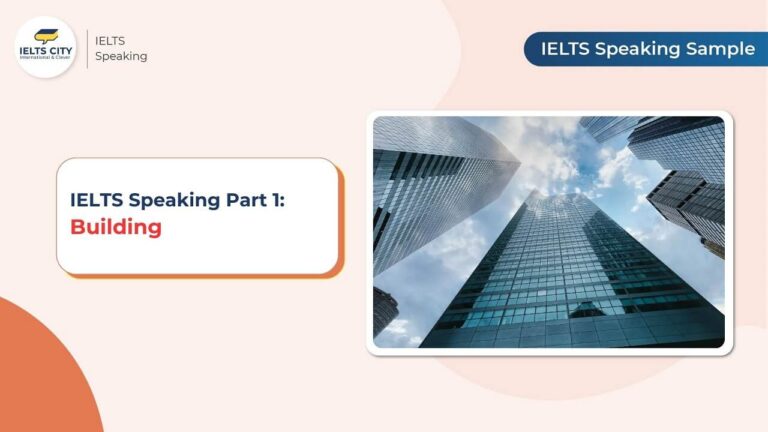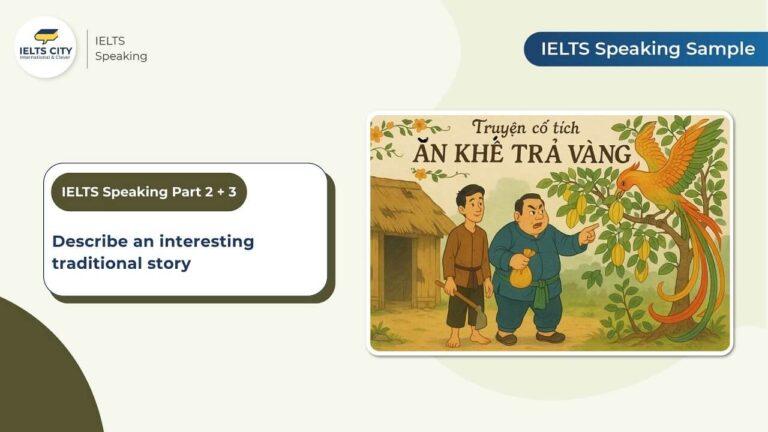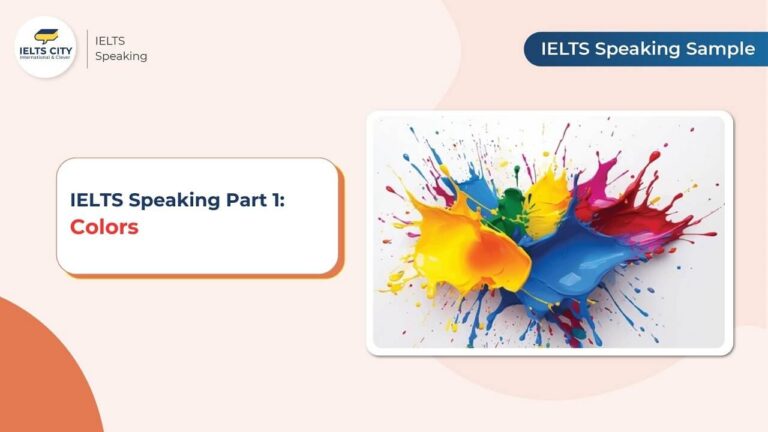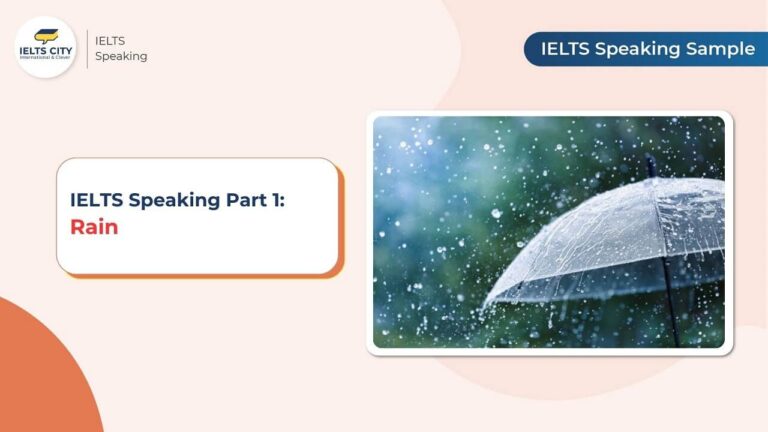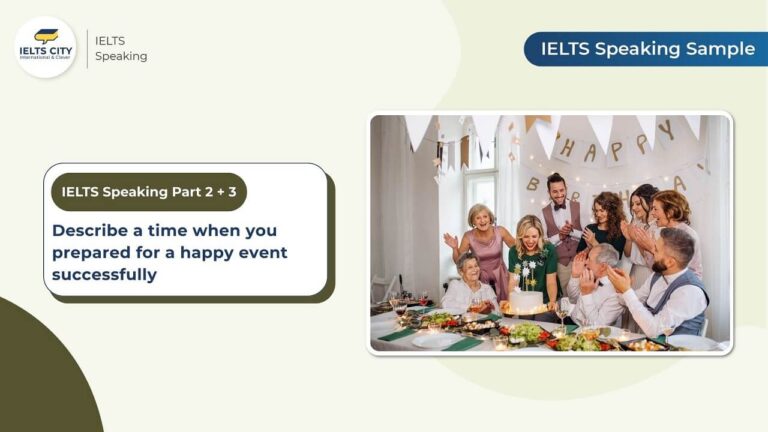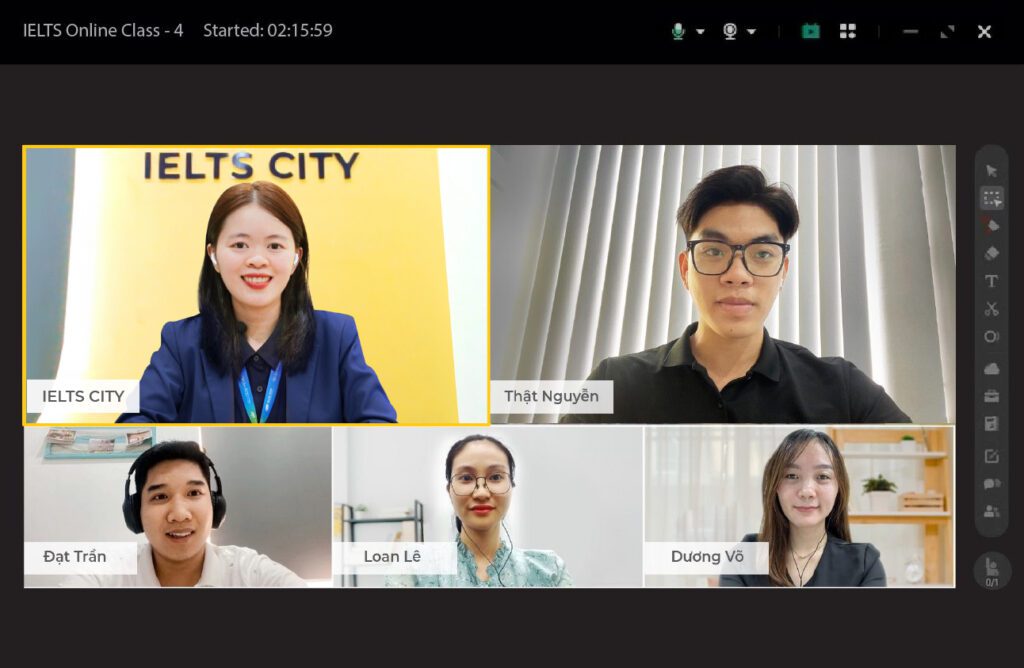Talk about Tet Holiday in Vietnam (Nói về Tết ở Việt Nam) là một trong những chủ đề cực phổ biến thuộc nhóm chủ đề Describe an event trong IELTS Speaking Part 2. Là người Việt Nam, chúng ta sẽ thấy rằng đây là chủ để mà ta có vô vàn ý tưởng để triển khai.
Trong bài viết này, IELTS CITY sẽ chỉ ra các từ vựng, cấu trúc hay về Tet Holiday topic và một số bài mẫu Speaking Part 2 và Part 3 để bạn tham khảo cách triển khai ý hay nhất nhé!
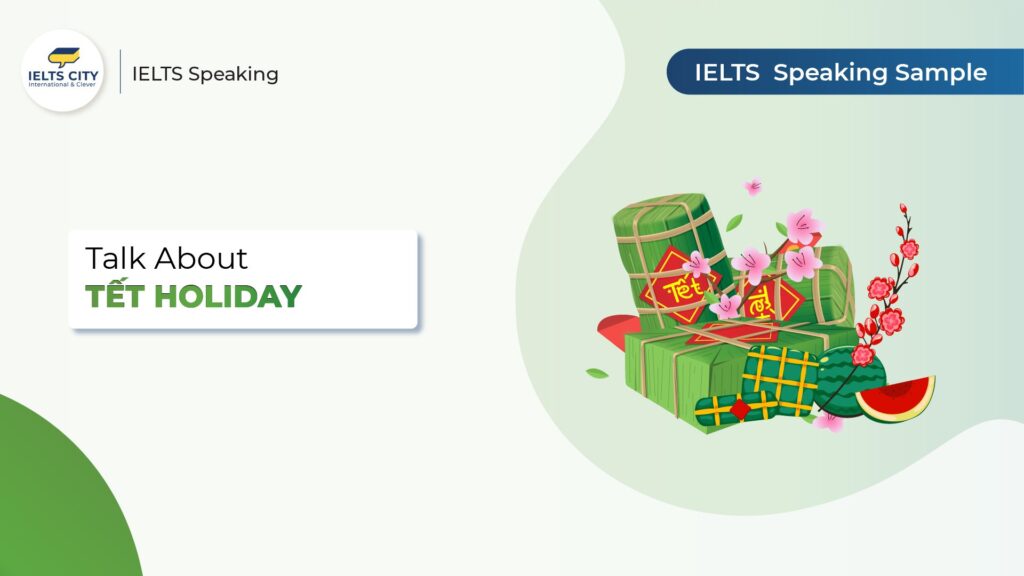
Nội dung chính
Toggle1. Bài mẫu Talk about Tet holiday – IELTS Speaking Part 2
Talk about the Tet holiday in your country.
You should say:
- When it takes place?
- Why it takes place?
- What the people do during this festival?
And explain why this festival is important to you?
1.1. Bài mẫu Talk about Tet holiday band 6.0
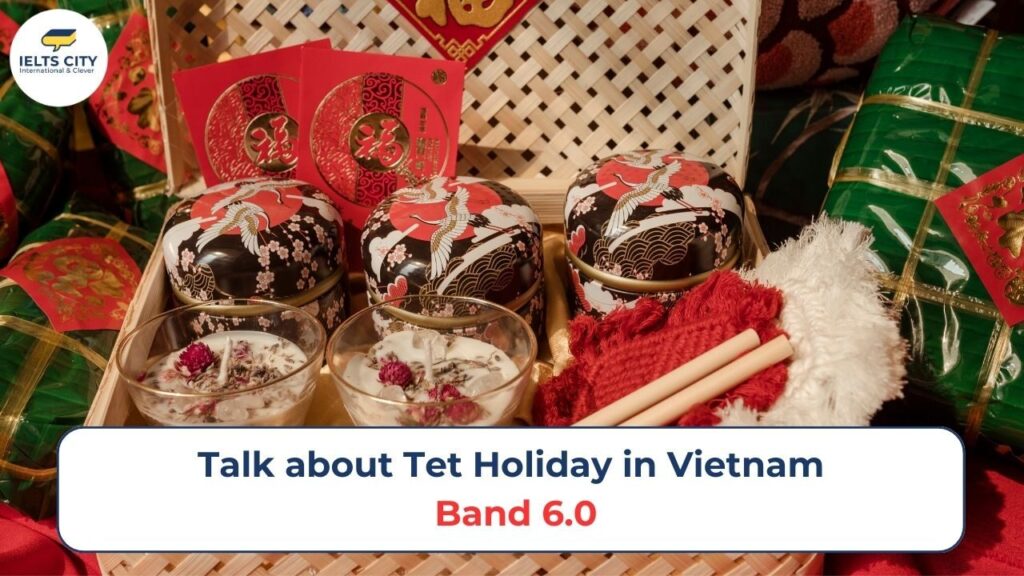
Dàn ý:
- Introduction
- Introduction to Tet, the Lunar New Year, in Vietnam.
- Mention of its occurrence in late January or early February.
- Highlighting its significance as a time for family celebration.
- Description of Tet
- Tet’s generational and cultural importance.
- Explanation of its association with the beginning of the new lunar calendar year.
- Noting the emphasis on cleaning, decorating homes, and following traditional customs.
- Tet Customs and Traditions
- Description of customs such as visiting temples, praying for luck, and preparing traditional foods.
- Mention of popular dishes like Vietnamese square sticky rice cake and Pork paste.
- Activities during Tet
- Overview of various activities during Tet, including family time, festive meals, and community events.
- Mention of the common practice of fireworks during celebrations.
- Personal Connection to Tet
- The personal importance of Tet, emphasizing family reunions.
- Acknowledgment of not closely adhering to all traditional customs.
- Tet’s significance as a time for a break and enjoying the festive atmosphere.
Bài mẫu:
Nhấn “►” để nghe Podcast bài mẫu:
In Vietnam, Tet, the Lunar New Year, usually takes place in late January or early February. It’s a time when families come together to celebrate and welcome the upcoming year. Tet has been celebrated for generations, and it holds cultural and traditional significance for the Vietnamese people.
The festival takes place to mark the beginning of the new lunar calendar year. During Tet, families clean and decorate their homes, and there’s a strong emphasis on traditional customs. People visit temples and pagodas to pray for good luck and prosperity. Traditional foods like Vietnamese square sticky rice cake and Pork paste are commonly prepared and shared among family members.
People do various things during Tet, such as spending time with family, enjoying festive meals, and participating in community events. Fireworks are also a common part of the celebrations.
Tet is somewhat important to me because it’s a time when I get to reunite with my family. However, I don’t follow all the traditional customs very closely. For me, it’s more about enjoying a break and the festive atmosphere.
Từ vựng:
- Generations: Thế hệ
- Emphasis: Nhấn mạnh
- Prosperity: Thịnh vượng
- Atmosphere: Bầu không khí
Dịch:
Ở Việt Nam, Tết Nguyên đán thường diễn ra vào cuối tháng Giêng hoặc đầu tháng Hai. Đây là thời điểm các gia đình quây quần bên nhau để ăn mừng và chào đón năm mới sắp tới. Tết đã được tổ chức qua nhiều thế hệ và nó mang ý nghĩa văn hóa, truyền thống đối với người dân Việt Nam.
Lễ hội diễn ra nhằm đánh dấu sự khởi đầu của một năm mới âm lịch. Trong dịp Tết, các gia đình dọn dẹp và trang trí nhà cửa, đồng thời nhấn mạnh vào các phong tục truyền thống. Người dân viếng đền, chùa để cầu may mắn, thịnh vượng. Các món ăn truyền thống như bánh chưng và giò lụa của Việt Nam thường được chuẩn bị và chia sẻ giữa các thành viên trong gia đình.
Mọi người làm nhiều việc khác nhau trong dịp Tết, chẳng hạn như dành thời gian cho gia đình, thưởng thức những bữa ăn ngày hội và tham gia các sự kiện cộng đồng. Pháo hoa cũng là một phần phổ biến của lễ kỷ niệm.
Tết có phần quan trọng đối với tôi vì đó là thời điểm tôi được đoàn tụ với gia đình. Tuy nhiên, tôi không tuân thủ chặt chẽ tất cả các phong tục truyền thống. Đối với tôi, điều quan trọng hơn là tận hưởng kỳ nghỉ và không khí lễ hội.
Đăng ký nhận tư vấn miễn phí
Ưu đãi học phí lên đến 45%
& Cơ hội nhận ngay 0,1 chỉ vàng 9999
Đăng ký nhận tư vấn miễn phí
Ưu đãi học phí lên đến 45%
________
1.2. Bài mẫu Talk about Tet holiday band 7.0
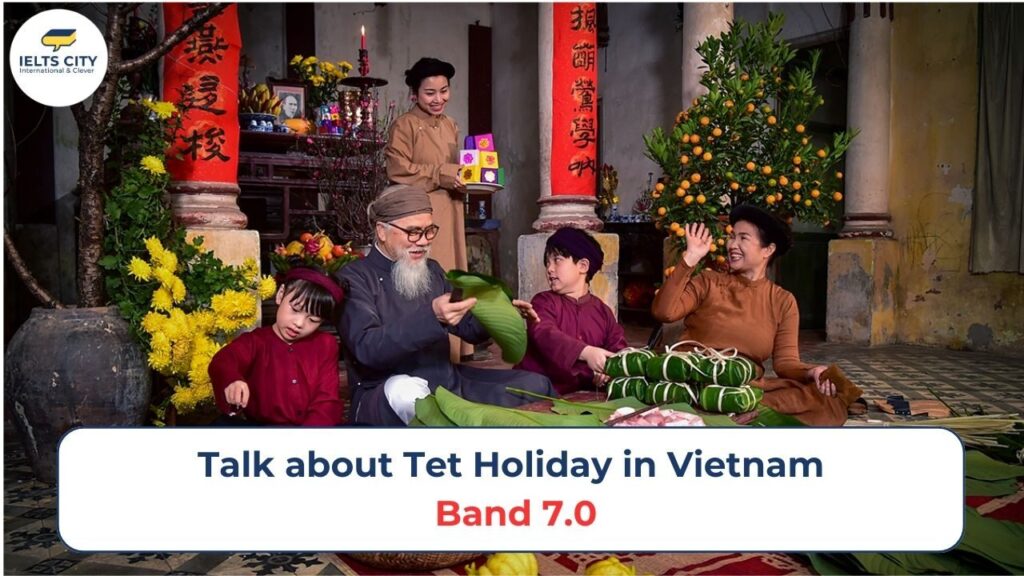
Dàn ý:
- Introduction
- Introduction to Tet, also known as the Lunar New Year, in Vietnam.
- Mention of the celebration period between late January and early February based on the lunar calendar.
- Emphasis on Tet as a deeply rooted tradition in cultural and familial practices.
- Description of Tet
- Tet’s purpose in marking the beginning of spring and symbolizing renewal.
- Families coming together to clean homes and decorate with traditional items.
- Significance of paying respects to ancestors and offering prayers for good fortune.
- Tet Activities
- Mention of various activities during Tet, including preparing traditional foods like Vietnamese square sticky rice cake.
- Families engaging in reunion dinners and the common tradition of fireworks displays.
- Personal Connection to Tet
- The importance of Tet in fostering a sense of togetherness and quality family time.
- Highlighting the vibrant community spirit during the celebration.
- The personal connection to Tet through cultural heritage and identity.
Bài mẫu:
Nhấn “►” để nghe Podcast bài mẫu:
In Vietnam, Tet, also known as the Lunar New Year, is a widely celebrated festival that usually occurs between late January and early February, corresponding to the lunar calendar. The festival is a time-honored tradition deeply rooted in cultural and familial practices.
Tet is celebrated to mark the beginning of spring, symbolizing renewal and the start of a new agricultural cycle. Families come together to clean their homes and adorn them with traditional decorations such as peach blossoms and kumquat trees. It’s a time when people pay respects to their ancestors and offer prayers for good fortune in the upcoming year.
During Tet, there are various activities that people engage in. Traditional foods like Vietnamese square sticky rice cake are prepared, and families often engage in reunion dinners. Fireworks displays are also a common sight during this festive period, adding to the celebratory atmosphere.
For me, Tet is important as it brings a sense of togetherness and allows for quality time with family. It’s a time when the community comes alive with a shared spirit of celebration. While the festival is a joyful occasion, it also carries a personal connection, reminding me of the cultural heritage that shapes my identity.
Từ vựng:
- Time-honored: Lâu dài, truyền thống
- Symbolizing: Tượng trưng cho
- Adorn: Trang trí
- Familial: Thuộc về gia đình
Dịch:
Ở Việt Nam, Tết hay còn gọi là Tết Nguyên đán là một lễ hội được tổ chức rộng rãi, thường diễn ra vào khoảng cuối tháng Giêng đến đầu tháng Hai âm lịch. Lễ hội là một truyền thống lâu đời có nguồn gốc sâu xa từ các tập tục văn hóa và gia đình.
Tết được tổ chức để đánh dấu sự khởi đầu của mùa xuân, tượng trưng cho sự đổi mới và bắt đầu một chu kỳ nông nghiệp mới. Các gia đình cùng nhau dọn dẹp nhà cửa và tô điểm bằng những đồ trang trí truyền thống như hoa đào, cây quất. Đó là thời điểm mọi người tỏ lòng thành kính với tổ tiên và cầu nguyện cho những điều may mắn trong năm tới.
Trong dịp Tết, có nhiều hoạt động khác nhau mà mọi người tham gia. Các món ăn truyền thống như bánh chưng Việt Nam được chuẩn bị sẵn và các gia đình thường tổ chức bữa tối đoàn tụ. Màn bắn pháo hoa cũng là cảnh thường thấy trong thời gian lễ hội này, làm tăng thêm không khí ăn mừng.
Đối với tôi, Tết rất quan trọng vì nó mang lại cảm giác đoàn kết và mang đến những khoảng thời gian vui vẻ bên gia đình. Đó là thời điểm cộng đồng trở nên sống động với tinh thần ăn mừng chung. Mặc dù lễ hội là một dịp vui vẻ nhưng nó cũng mang một sự kết nối cá nhân, nhắc nhở tôi về di sản văn hóa đã hình thành nên bản sắc của tôi.
1.3. Bài mẫu Describe Tet holiday band 8.0
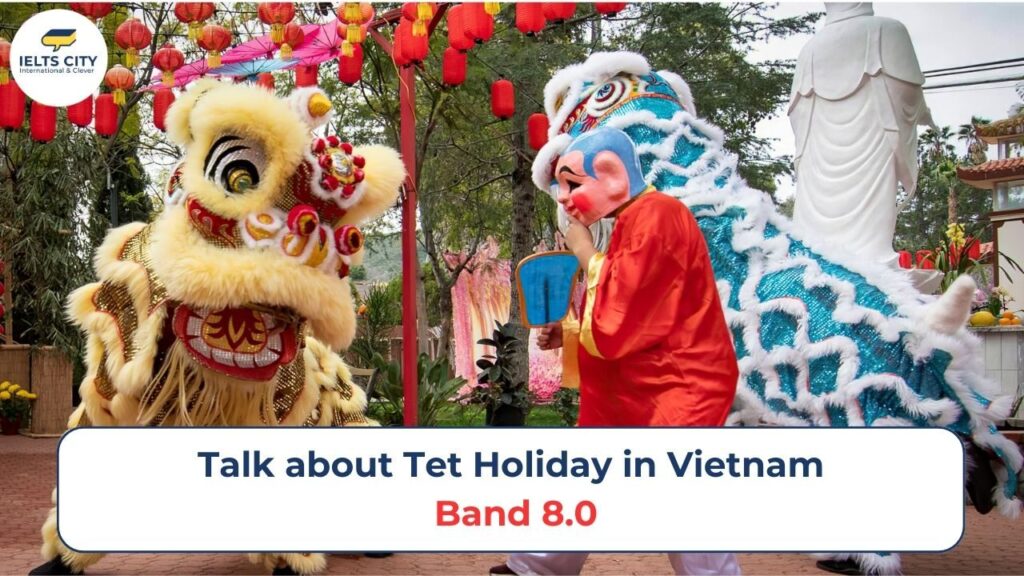
Dàn ý:
- Introduction
- Introduction to Tet as the Lunar New Year in Vietnam.
- Mention of its momentous celebration occurring in late January to early February.
- Cultural and Spiritual Significance
- Description of Tet’s profound cultural and spiritual significance.
- Emphasis on the transition from the old year to the new one.
- Traditional Preparations
- Tet’s deep roots in Vietnamese traditions.
- Meticulous preparations involving cleaning, decorating homes, and symbolic elements like peach blossoms and kumquat trees.
- Festive Atmosphere and Activities
- Description of the charged atmosphere filled with excitement and joy during Tet.
- Engagement in various activities, including making traditional foods and cultural performances like dragon dances.
- Families coming together for a festive meal and exchanging warm wishes and gifts.
- Personal Connection to Tet
- The festival’s importance on a personal level.
- Tet as an encapsulation of Vietnamese culture and heritage.
- Reinforcement of family bonds and the values of gratitude and respect for cultural roots.
- Tet as a reminder of the rich cultural tapestry shaping the speaker’s identity.
Bài mẫu:
Nhấn “►” để nghe Podcast bài mẫu:
In Vietnam, Tet, the Lunar New Year, is a momentous celebration that occurs around late January to early February, following the lunar calendar. This festival holds profound cultural and spiritual significance, marking the transition from the old year to the new one.
Tet is deeply rooted in Vietnamese traditions, symbolizing the renewal of life and the honoring of ancestors. The meticulous preparations for Tet start well in advance, with families cleaning and decorating their homes, often using symbols like peach blossoms and kumquat trees to bring good luck and prosperity.
During Tet, the atmosphere is charged with excitement and joy. People engage in various activities, such as making traditional foods like Vietnamese square sticky rice cake and engaging in cultural performances like dragon dances. Families come together for a festive meal, exchanging warm wishes and gifts.
The festival is important to me on a personal level because it encapsulates the essence of Vietnamese culture and heritage. It’s a time when family bonds are strengthened, and the values of gratitude and respect for one’s roots are emphasized. Tet serves as a reminder of the rich cultural tapestry that shapes my identity, making it a celebration that I hold dear and look forward to each year.
Từ vựng:
- Momentous: Quan trọng, trọng đại
- Profound: Sâu sắc
- Meticulous: Tỉ mỉ, cẩn thận
- Encapsulates: Tóm gọn, bao quát
- Tapestry: thảm thêu (trong bài mẫu sử dụng với ý chỉ Tết như là một tấm thảm được thêu dệt từ văn hóa phong phú tại Việt Nam)
Dịch:
Ở Việt Nam, Tết Nguyên đán là một lễ kỷ niệm trọng đại diễn ra vào khoảng cuối tháng 1 đến đầu tháng 2 theo âm lịch. Lễ hội này có ý nghĩa văn hóa tâm linh sâu sắc, đánh dấu sự chuyển giao từ năm cũ sang năm mới.
Tết đã ăn sâu vào truyền thống của người Việt, tượng trưng cho sự đổi mới của cuộc sống và việc tưởng nhớ tổ tiên. Việc chuẩn bị tỉ mỉ cho Tết bắt đầu từ trước, các gia đình dọn dẹp, trang trí nhà cửa, thường sử dụng các biểu tượng như hoa đào, cây quất để mang lại may mắn và thịnh vượng.
Trong dịp Tết, không khí tràn ngập niềm vui và phấn khởi. Mọi người tham gia vào nhiều hoạt động khác nhau, chẳng hạn như làm các món ăn truyền thống như Bánh chưng và tham gia vào các buổi biểu diễn văn hóa như múa rồng. Các gia đình quây quần bên nhau trong một bữa tiệc thịnh soạn, trao nhau những lời chúc ấm áp và những món quà.
Lễ hội rất quan trọng đối với tôi ở cấp độ cá nhân vì nó gói gọn tinh hoa của văn hóa và di sản Việt Nam. Đó là thời điểm mà mối quan hệ gia đình được củng cố và các giá trị về lòng biết ơn và sự tôn trọng cội nguồn của mỗi người được nhấn mạnh. Tết như một lời nhắc nhở về tấm thảm văn hóa phong phú đã hình thành nên bản sắc của tôi, khiến nó trở thành một kỳ lễ mà tôi yêu quý và mong đợi hàng năm.
2. Bài mẫu IELTS Speaking Part 3 chủ đề Tet holiday
4.1. How do people in Vietnam value traditional festivals?
In Vietnam, traditional festivals hold immense cultural and social importance. These festivals are not merely events; they are deeply ingrained in the fabric of Vietnamese identity. People value them as occasions to reconnect with their cultural roots, strengthen family bonds, and express gratitude to ancestors. The significance of traditional festivals is evident in the meticulous preparations, widespread participation, and the respect shown to customs and rituals. These festivals are a time when communities come together, emphasizing the shared cultural heritage that defines Vietnamese society.
Từ vựng:
- Ingrained: Đã thấm sâu
- Meticulous: Tỉ mỉ
- Occasions: Dịp
- Fabric: Cấu trúc, bản sắc
- Significance: Ý nghĩa
Dịch:
Ở Việt Nam, lễ hội truyền thống có tầm quan trọng văn hóa và xã hội to lớn. Những lễ hội này không chỉ đơn thuần là sự kiện; chúng đã ăn sâu vào bản sắc Việt Nam. Mọi người coi đây là dịp để kết nối lại với cội nguồn văn hóa, củng cố mối quan hệ gia đình và bày tỏ lòng biết ơn với tổ tiên. Ý nghĩa của lễ hội truyền thống thể hiện rõ ở sự chuẩn bị tỉ mỉ, sự tham gia rộng rãi và sự tôn trọng các phong tục, nghi lễ. Những lễ hội này là thời điểm các cộng đồng xích lại gần nhau, nhấn mạnh di sản văn hóa chung đã định hình nên xã hội Việt Nam.
2.2. What’s the difference between the ways festivals are celebrated now and in the past?
The celebration of festivals has undergone notable changes over time. In the past, festivals were often more localized, with communities engaging in traditional rituals and practices. However, in contemporary times, there is a greater emphasis on regional and national unity during festivals. Additionally, advancements in technology and increased urbanization have influenced the way festivals are celebrated. Nowadays, people may incorporate modern elements into traditional celebrations, such as using social media to share festival experiences or incorporating contemporary art forms into festivities.
Từ vựng:
- Localized: Địa phương hóa
- Urbanization: Đô thị hóa
- Contemporary: Đương đại
- Influence: Ảnh hưởng
- Undergone: Trải qua
Dịch:
Việc tổ chức các lễ hội đã trải qua những thay đổi đáng chú ý theo thời gian. Trước đây, các lễ hội thường mang tính địa phương hóa hơn, với việc cộng đồng tham gia vào các nghi lễ và tập tục truyền thống. Tuy nhiên, ở thời hiện đại, sự đoàn kết khu vực và quốc gia trong các lễ hội được chú trọng nhiều hơn. Ngoài ra, những tiến bộ trong công nghệ và đô thị hóa gia tăng đã ảnh hưởng đến cách tổ chức lễ hội. Ngày nay, mọi người có thể kết hợp các yếu tố hiện đại vào các lễ kỷ niệm truyền thống, chẳng hạn như sử dụng mạng xã hội để chia sẻ trải nghiệm lễ hội hoặc kết hợp các loại hình nghệ thuật đương đại vào lễ hội.
2.3. Do you think western festivals like Christmas are replacing traditional festivals in Vietnam?
While western festivals like Christmas have gained popularity in Vietnam, especially in urban areas, they do not replace traditional festivals. Traditional festivals continue to be deeply rooted in Vietnamese culture, and their significance remains strong. Western festivals may be embraced as a form of cultural exchange, providing an opportunity for Vietnamese people to experience and appreciate different traditions. However, the coexistence of western and traditional festivals is more indicative of cultural diversity rather than the replacement of one by the other.
Từ vựng:
- Embraced: Đón nhận
- Indicative: Chỉ ra, biểu hiện
- Coexistence: Sự cùng tồn tại
Dịch:
Mặc dù các lễ hội phương Tây như Giáng sinh đã trở nên phổ biến ở Việt Nam, đặc biệt là ở các khu vực thành thị, nhưng chúng không thay thế được các lễ hội truyền thống. Các lễ hội truyền thống tiếp tục ăn sâu vào văn hóa Việt Nam và ý nghĩa của chúng vẫn còn rất lớn. Lễ hội phương Tây có thể được coi là một hình thức trao đổi văn hóa, tạo cơ hội cho người Việt Nam trải nghiệm và trân trọng những truyền thống khác nhau. Tuy nhiên, sự cùng tồn tại của các lễ hội phương Tây và truyền thống thể hiện sự đa dạng văn hóa hơn là sự thay thế cái này bằng cái kia.
2.4. Do you think it is wrong for young people to not celebrate traditional festivals?
It is not necessarily wrong for young people to choose not to celebrate traditional festivals. Cultural appreciation and participation are personal choices influenced by various factors, including lifestyle, upbringing, and personal beliefs. While engaging in traditional festivals can foster a sense of identity and community, individuals may have different preferences or commitments. What is essential is maintaining an understanding and respect for one’s cultural heritage, even if the mode of celebration varies. The key is to strike a balance between individual choices and preserving cultural values.
Từ vựng:
- Necessarily: Chắc chắn
- Commitments: Cam kết, trách nhiệm
- Cultural Appreciation: Đánh giá văn hóa
- Influence: Ảnh hưởng
- Foster: Nuôi dưỡng, khuyến khích
- Preserving: Bảo tồn, giữ gìn
Dịch:
Việc giới trẻ lựa chọn không tổ chức các lễ hội truyền thống không hẳn là sai. Đánh giá cao và tham gia văn hóa là những lựa chọn cá nhân bị ảnh hưởng bởi nhiều yếu tố khác nhau, bao gồm lối sống, trình độ giáo dục và niềm tin cá nhân. Mặc dù việc tham gia vào các lễ hội truyền thống có thể nuôi dưỡng ý thức về bản sắc và cộng đồng nhưng các cá nhân có thể có những sở thích hoặc cam kết khác nhau. Điều thiết yếu là duy trì sự hiểu biết và tôn trọng di sản văn hóa của mình, ngay cả khi phương thức cử hành có khác nhau. Điều quan trọng là đạt được sự cân bằng giữa lựa chọn cá nhân và bảo tồn các giá trị văn hóa.
Tham khảo bài mẫu chủ đề liên quan:
3. Từ vựng về topic Tet holiday
3.1. Những mốc thời gian quan trọng
- Before New Year’s Eve: Tất niên
- New Year’s Eve: Đêm Giao Thừa
- Lunar New Year: Tết Nguyên Đán
3.2. Các món ăn ngày Tết
- Vietnamese square sticky rice cake: bánh chưng
- Vietnamese cylindrical sticky rice cake: bánh tét
- Dried candied fruits: mứt
- Braised pork and eggs: thịt kho trứng
- Pickled small leeks: củ kiệu
- Jellied meat: Thịt đông
- Pork paste: Giò lụa
- Pig trotters: Chân giò
- Roasted watermelon seeds: hạt dưa
- Dried bamboo shoots: Măng khô
- Sunflower seeds: Hạt hướng dương
- Pumpkin seeds: Hạt bí
- Cashew nuts: Hạt điều
- Pistachio nuts: Hạt dẻ cười
- Dried lotus seeds: Hạt sen sấy
Tham khảo thêm: Từ vựng về Food
3.3. Các hoạt động ngày Tết
- Spring cleaning: dọn dẹp nhà vào năm mới
- Get rid of bad spirit: xua đuổi tà ma
- Light incense sticks: thắp nhang
- Family reunion/family gathering: cuộc đoàn tụ gia đình
- Worship the ancestor: thờ cúng tổ tiên
- Decorate the house: Trang trí nhà cửa
- Exchange New Year’s wishes: Chúc Tết nhau
- Visit pagoda: Viếng chùa
- Visit relatives and friends: Thăm bà con bạn bè
- Go to flower market: Đi chợ hoa
- To return to hometown: Về quê
- Bid their ancestor farewell: Đưa ông bà
3.4. Biểu tượng Tết
- Peach blossom: Hoa đào
- Apricot blossom: Hoa mai
- Parallel sentences: Câu đối
- Lucky money: Tiền lì xì
- Calligraphy pictures: Thư pháp
- Fireworks: Pháo hoa
- Five – fruit tray: Mâm ngũ quả
- Annona: Mãng cầu
- Papaya: Đu đủ
- Mango: Xoài
- Marigold: Cúc vạn thọ
- Chrysanthemum: Cúc đại đóa
- Orchid: Hoa lan
- Paperwhite: Hoa thủy tiên
- Watermelon: Dưa hấu
3.5. Các từ vựng khác về chủ đề Tết
- Ritual: Lễ nghi
- Altar: Bàn thờ
- Incense stick: Nhang
- Lunar calendar: Lịch Âm lịch
- First caller: Người xông đất
- Health, Happiness, Luck & Prosperity: “Khỏe mạnh, Hạnh phúc, May mắn, & Thịnh vượng”
- Sweep the floor: Quét nhà
- Taboo: Điều cấm kỵ
- The Kitchen Gods: Táo quân
4. Cấu trúc câu diễn đạt hay cho chủ đề Tết
Giới thiệu:
- Tet is a special occasion in Vietnam and holds great significance for everyone: Tết là một dịp đặc biệt ở Việt Nam và có sự ý nghĩa lớn đối với mọi người.
- Tet is an important time in my culture because…: Tết là thời điểm quan trọng trong nền văn hóa của tôi vì..
- Speaking of Tet, I cannot help but mention…: Nói về Tết, tôi không thể không nhắc đến…
Mô tả Tết:
- Tet Nguyen Dan is a time when people come together with family and friends: Tết Nguyên Đán là dịp mọi người quây quần bên gia đình và bạn bè.
- Vietnamese people usually prepare warm and intimate feasts to welcome the new year: Người Việt thường chuẩn bị những bữa tiệc ấm cúng và thân mật để chào đón năm mới.
- People often spend time cleaning their homes and decorating with plants, peach blossoms, and lanterns: Mọi người thường dành thời gian để lau chùi nhà cửa và trang trí bằng cây cỏ, hoa mai và đèn lồng.
Nói về kỷ niệm và truyền thống:
- Tet is also a time to reflect on the achievements and memories of the past year: Tết còn là dịp để nhìn lại những thành tựu và kỷ niệm của năm cũ.
- During Tet, people often visit each other, exchange Tet greetings, and give lucky money: Trong những ngày Tết, người ta thường thăm viếng nhau, chúc Tết và trao nhau những lì xì may mắn.
- An important tradition is visiting temples to pray for luck and goodness for the family: Một truyền thống quan trọng là việc thăm đền chùa để cầu may mắn và tốt lành cho gia đình.
Kết bài:
- In conclusion, Tet is a crucial and meaningful time in the lives of the Vietnamese people: Tóm lại, Tết là một thời điểm quan trọng và ý nghĩa trong đời sống của người Việt Nam.
- Every year during Tet, I always look forward to new experiences and memorable moments: Mỗi năm về Tết, tôi luôn mong đợi những trải nghiệm mới và những khoảnh khắc đáng nhớ
Để có nguồn đề luyện thi IELTS Speaking tốt nhất, các bạn đừng quen theo dõi bài viết Tổng hợp đề thi IELTS Speaking 2025 của IELTS CITY nhé!
Vậy là IELTS CITY đã cung cấp đầy đủ từ vựng, cấu trúc câu và 3 bài mẫu band 6.0,7.0 và 8.0 về Topic Talk about Tet holiday rồi. Hy vọng với những kiến thức này, các bạn có thể tự tin và nói về những trải nghiệm của mình về Tết một cách mượt mà nhất nhé. Chúc các bạn thành công


